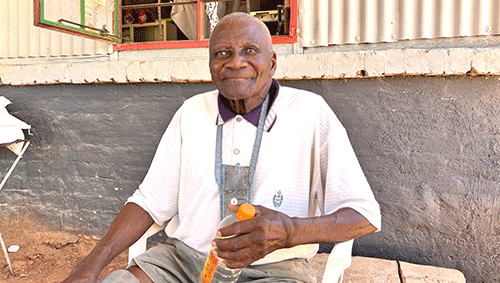Charmaine Boois
MARIENTAL – More than 29 000 pensioners born before 1944 have registered to vote in the upcoming elections, the Electoral Commission of Namibia (ECN) recently announced. They will form part of the thousands of Namibians going to the polls on Wednesday to vote in the Presidential and National Assembly Elections.
In the Hardap Region, Nampa met two remarkable pensioners who have lived through apartheid, the dawn of independence, and the political changes that followed. Their experiences highlight Namibia’s spirit of resilience as well as unfulfilled promises that continue to weigh on their communities.
At 91 years old, Abraham Nuseb, affectionately known as Oupa Masen, sits in the comfort of his home in Stampriet. His eyes bear the weight of decades, yet his warm smile expresses an enduring hope. A lifelong supporter of the Democratic Turnhalle Alliance (DTA), now the Popular Democratic Movement (PDM), Nuseb’s perspective is one of gratitude intertwined with urgency.
He began working at the tender age of 13, balancing school with farm labour, looking after goats and sheep on a farm near Stampriet. Oupa Masen’s memories of apartheid are vivid and painful. “It’s many years back, but I can still feel and smell the oppression. Those were difficult times. We didn’t have the freedom to voice our concerns like we do now,” he recalls.
Growing up near Stampriet in the 1940s, Nuseb saw firsthand the inequities of the then South West Africa under South African rule. Nonetheless, he is quick to acknowledge the transformation brought about by Swapo, which he said “fought tooth and nail.”
“Blood was shed for us to enjoy the freedom we have today because of Swapo. We wake up without fear of oppression, and for that, I am grateful,” said Nuseb. However, Nuseb does not hesitate to criticise the existing condition of affairs. He praises the Landless People’s Movement (LPM) in Stampriet for initiatives such as prepaid water meters but emphasises that unemployment, particularly among young people, is a persistent issue.
“The next elected leader must empower the youth. They are the future of this country. Here in Stampriet, many young people are unemployed. That must be their priority,” Nuseb emphasised. He believes their empowerment is not just a matter of policy but a necessity for the nation’s survival.
“Young people are the backbone of our country. Without them, Namibia has no future. Leaders must invest in their skills and opportunities” Nuseb added.
Despite being a dedicated PDM suppor t e r, Nus eb provided a balanced appraisal of Namibia’s political scene. “Swapo is not corrupt. It’s the people working within the party who are corrupt. LPM, so far, has not shown signs of corruption, and I respect that,” Nuseb notes.
In Hoachanas, 97-year-old retiredAMEpastorAdamGarisebis a renowned elder in his community. Gariseb shared what he can remember of the apartheid years. “During apartheid we were oppressed by the colonisers, they did nothing for us. When Swapo won our freedom, we gained our dignity and a voice.
But e ven now, we a re s t i ll in e c onomic slavery,” Gariseb recounts. A village of shacks and widespread unemployment, Hoachanas struggles with basic infrastructure. Pastor Gariseb recalls the installation of three boreholes decades ago, yet water scarcity remains a significant concern.
“In my 97 years, I have never seen a post office in Hoachanas. I want to see development, for example a post office, a clinic, and schools before my soul departs from this earth,” Gariseb noted. For Gariseb, the elections are a source of hope. He envisions a leader who will bring genuine change to his beloved Hoachanas, addressing its water crisis and laying the groundwork for a better future. “We have the potential to grow, but we need someone who truly understands our struggles and works for the people, not just for power,” Gariseb stated.
Gariseb’s wish list for his community unders core s the dispa r i ty be twe e n urban and rural Namibia. Access to basic services that many take for granted, like a nearby clinic or reliable water supply, remains out of reach for residents of Hoachanas.
“It is hard to believe we are still living like this after so many years of independence, but I have faith that change will come, even if I may not live to see it,” he says. Despite their differences in background and political allegiance, Nuseb and Gariseb share the same concern which is unemployment, especially among the youth, and the urgent need for development in their communities.
Their stories paint a picture of a nation that has come far but still has miles to go, and a future that lies in the hands of those who have the courage to lead with integrity and a commitment to serve. “Before my body becomes dust, I want to see a better Hoachanas, a better country,” stated Gariseb.
-Nampa


